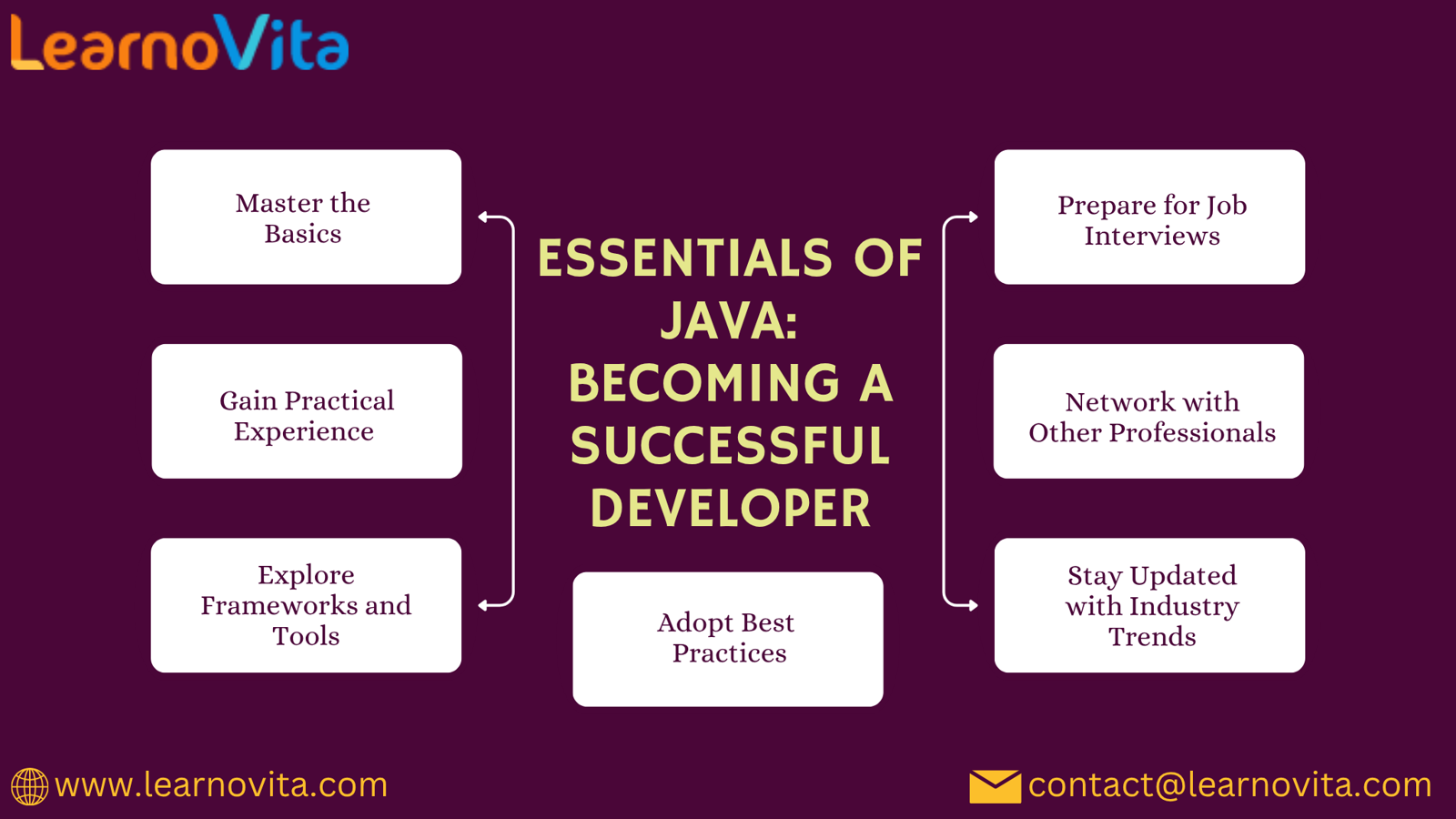Java Fundamentals: How to Thrive as a Java Developer
Java has established itself as one of the most widely used programming languages in the world, powering everything from mobile applications to large enterprise systems. If you're aiming to become a successful Java developer, a solid understanding of the fundamentals is essential. In this blog, we'll explore the core concepts of Java and provide actionable tips to help you thrive in your development career.
If you want to excel in this career path, then it is recommended that you upgrade your skills and knowledge regularly with the latest Java Online Course.

Why Java?
Java was created by Sun Microsystems in the mid and has evolved into a powerful, object-oriented programming language. Here are some reasons why Java is a great choice for developers:
- Platform Independence: Java's "Write Once, Run Anywhere" (WORA) capability means that applications can run on any device with a Java Virtual Machine (JVM).
- Robustness and Security: Java is designed with built-in security features, making it a favored choice for enterprise applications.
- Rich Ecosystem: Java offers a vast array of libraries and frameworks that simplify the development process and enhance productivity.
Core Java Fundamentals
To thrive as a Java developer, you must master the following fundamental concepts:
1. Basic Syntax and Data Types
Understanding Java's syntax is crucial:
- Data Types: Familiarize yourself with primitive data types (int, float, char, etc.) and reference types (strings, arrays, etc.).
- Control Structures: Learn how to use loops (for, while) and conditionals (if, switch) to control the flow of your program.
2. Object-Oriented Programming (OOP)
Java is fundamentally object-oriented, so grasping OOP principles is essential:
- Classes and Objects: Understand how to define classes and create objects, which are instances of classes.
- Inheritance: Learn how to create subclasses that inherit properties and methods from parent classes.
- Encapsulation: Master the art of bundling data (attributes) and methods that operate on the data within a single unit (class).
- Polymorphism: Explore how one interface can be used for different data types, allowing methods to do different things based on the object that it is acting upon.
3. Core Java Libraries
Familiarizing yourself with Java's built-in libraries will enhance your productivity:
- Java Collections Framework: Learn to use data structures like lists, sets, and maps to effectively manage collections of objects.
- Java I/O: Understand how to handle input and output operations, including reading from and writing to files.
- Concurrency: Get acquainted with Java’s threading model to develop multi-threaded applications.
With the aid of Best Software Training Institute programs, which offer comprehensive training and job placement support to anyone looking to develop their talents, it’s easier to learn this tool and advance your career.

Best Practices for Java Development
1. Version Control
- Use Git: Learn to use Git for version control to manage your codebase effectively and collaborate with others. Familiarize yourself with commands.
2. Testing Your Code
- Unit Testing: Understand the importance of testing and become familiar with frameworks like JUnit to write unit tests for your code.
- Test-Driven Development (TDD): Consider adopting TDD principles, where you write tests before coding your features, ensuring your code meets requirements from the start.
3. Engage in Code Reviews
- Collaborate with Peers: Participate in code reviews to learn from others, improve your coding practices, and gain insights into different approaches to problem-solving.
4. Documentation
- Maintain Clear Documentation: Document your code thoroughly to make it easier for others (and your future self) to understand and maintain your work.
Continuous Learning and Networking
The tech landscape is always evolving, so staying updated is crucial for your success:
1. Follow Industry Trends
- Subscribe to Blogs and Podcasts: Stay informed about new developments, tools, and best practices in Java by following reputable blogs and podcasts.
2. Join Developer Communities
- Engage Online: Participate in forums like Stack Overflow and Reddit to ask questions, share knowledge, and connect with fellow developers.
- Attend Meetups and Conferences: Join local Java user groups and attend industry conferences to network and learn from experts in the field.
3. Practice Coding Challenges
- Use Platforms: Engage with coding challenge platforms like LeetCode and HackerRank to sharpen your skills and prepare for technical interviews.
Conclusion
Mastering the fundamentals of Java is the first step toward becoming a successful developer. By focusing on core concepts, adopting best practices, and staying engaged with the community, you can thrive in your Java development career. Remember, continuous learning and networking are key to long-term success. With dedication and effort, you’ll be well on your way to achieving your goals as a Java developer.
- Questions and Answers
- Opinion
- Motivational and Inspiring Story
- Technology
- Live and Let live
- Focus
- Geopolitics
- Military-Arms/Equipment
- الحماية
- Economy
- Beasts of Nations
- Machine Tools-The “Mother Industry”
- Art
- Causes
- Crafts
- Dance
- Drinks
- Film/Movie
- Fitness
- Food
- الألعاب
- Gardening
- Health
- الرئيسية
- Literature
- Music
- Networking
- أخرى
- Party
- Religion
- Shopping
- Sports
- Theater
- Health and Wellness
- News
- Culture

